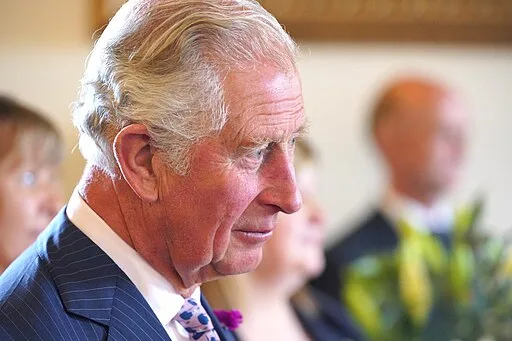King Charles III’s wealth has soared to $770 million, making him the 258th wealthiest person in the UK, outpacing his late mother, Queen Elizabeth
King Charles III’s personal wealth has now surpassed the net worth of his late mother, Queen Elizabeth. At 74, the monarch’s fortune has climbed to $770 million, placing him as the 258th wealthiest person in the United Kingdom, according to The Sunday Times Rich List 2024. This marks a significant increase of $12 million since the 2023 publication of the Rich List.
Before her death in September 2022, Queen Elizabeth’s wealth was estimated at $468 million, according to the Times Rich List 2022. King Charles’ current wealth is significantly higher, highlighting his financial acumen and the strategic management of his estates.
However, King Charles’ fortune pales in comparison to that of Hugh Grosvenor, the Duke of Westminster, who is the godfather of Prince George, the eldest son of Prince William and Kate Middleton. Grosvenor’s family fortune stands at a staggering $12.8 billion. The 33-year-old duke was named as one of George’s seven godparents in 2013 and is also reportedly a godfather to Prince Archie, though Prince Harry and Meghan Markle have not publicly confirmed their son’s godparents.
Embed from Getty ImagesCharles’ estates, Sandringham House and Balmoral Castle are among his most valuable assets. A former aide to the king revealed that Charles significantly rebuilt his wealth following a financial hit due to his divorce from Princess Diana, who received $22.5 million in their 1996 settlement. The aide explained that Charles increased his wealth by saving profits from the Duchy of Cornwall, a $1.4 billion estate encompassing 130,000 acres of land, 260 farms, and various investments.
“He became prudent at tucking away some money from the Duchy after that wipeout of capital,” the former aide told the Times. “We’re not talking vast sums here — several tens of millions, no more. There have been suggestions that [Charles’ wife Queen] Camilla brought a good deal of money into their relationship, but that’s really not correct.”
Established by King Edward III in 1337, the Duchy of Cornwall has been passed down to each Duke of Cornwall. Prince William inherited the duchy after Charles ascended to the throne following Elizabeth’s death. Between 2011 and 2022, Charles increased the duchy’s annual profits by 42.6% to over $31 million. The total worth of the duchy jumped by nearly 50% during these years, providing Charles with over $268 million from the estate.
Charles also inherited an investment portfolio valued at approximately $151 million after Queen Elizabeth’s passing. Additionally, the royal family receives a Sovereign Grant annually from the British government to fund official royal duties. Despite these known assets, The Sunday Times notes that the total wealth of the royal family remains challenging to estimate due to the unknown value of their extensive collection of jewellery, art, and historical gifts.
Analysis:
King Charles III’s rising wealth underscores the financial robustness and strategic management within the British monarchy. This significant increase in his fortune, outstripping the net worth of his late mother, Queen Elizabeth, provides insight into the economic dynamics at play within the royal family.
Politically, Charles’ growing wealth positions him as a formidable figure in the UK’s socio-economic landscape. As a monarch, his financial status may influence public perceptions and the broader political discourse surrounding the monarchy’s role and relevance in modern Britain. This substantial wealth, while indicative of personal financial success, could also attract scrutiny regarding the monarchy’s funding and the use of public funds through the Sovereign Grant.
From a sociological perspective, the wealth disparity within the royal family, especially when compared to figures like Hugh Grosvenor, highlights the varying degrees of affluence among the British elite. Grosvenor’s immense wealth, significantly exceeding that of King Charles, underscores the concentration of wealth among a small number of hereditary peers and the historical accumulation of assets.
Economically, King Charles’ financial growth demonstrates the effective management of the Duchy of Cornwall, which has been a crucial source of income. The increase in annual profits and the overall value of the duchy reflect prudent investment strategies and resource management. This economic stability not only secures the financial future of the monarchy but also reinforces the significance of estate management within royal duties.
From a gender perspective, the focus on financial prudence following the divorce settlement with Princess Diana highlights the economic challenges faced by royal women during separations. The substantial settlement Diana received reflects the financial negotiations that occur within royal divorces and the impact these have on royal finances.
In terms of race and minority perspectives, the royal family’s wealth and the management of its assets may also intersect with broader discussions on colonialism and historical wealth accumulation. The origins of the Duchy of Cornwall and other royal assets, often linked to historical land ownership and colonial enterprises, may prompt critical examination of the sources of this wealth and calls for transparency and reparations.
In conclusion, King Charles III’s substantial increase in personal wealth reflects strategic financial management and highlights the complex socio-economic and political dimensions of royal finances. This financial narrative intertwines with broader societal discussions on wealth distribution, historical legacies, and the evolving role of the monarchy in contemporary Britain.
